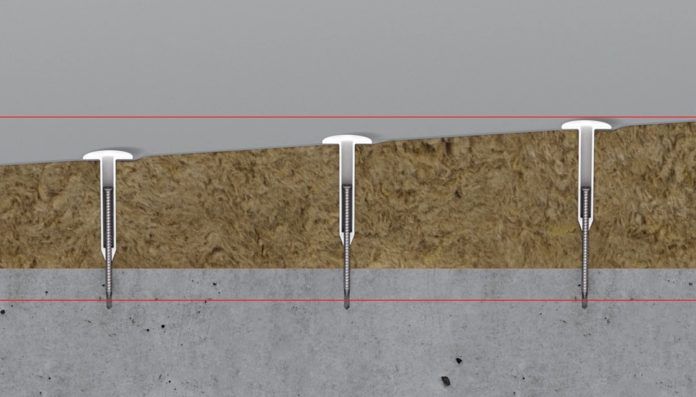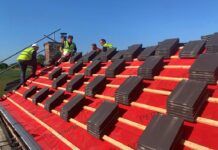Kevin Rackley, product manager for flat roofing fastener systems at EJOT UK, explains to RCI why mechanical fastener innovation is helping installers to streamline the flat roofing installation process when using tapered insulation to save time and money.
With ‘cut to falls’ (tapered) insulation offering an obvious way to ensure that sufficient water channelling and drainage is provided on concrete decks, it is no surprise that we are seeing more widespread use.
Today, it is estimated that nearly one in three flat roofs use a tapered roof insulation system, partly driven by more complex building designs, but it is an approach that is not without its challenges.
The most obvious of these is that the insulation varies in thickness across the roof area. This means that if you are using mechanical fixings, you will need a variety of fastener and stress plate combinations optimally suited for the respective insulation thickness.
Some installers also find that sourcing an extremely long SDS drill can be as difficult as the physical process of drilling into concrete through this depth of insulation.
As a result, for many installers the preferred approach is to bond the tapered insulation to the concrete or screeded deck. Simple in principle, but unfortunately problematic too.
Firstly, it is dependent on the condition of the deck, which can be a particular problem in refurbishment projects where conditions may vary significantly.
Secondly, a much more unpredictable issue is the weather. You will only be able to bond the insulation boards when the weather conditions are right, so poor conditions on-site can result in costly delays.
Overcoming these challenges is important to ensure tapered insulation’s use can continue to grow, which is why the product development team at EJOT UK has been working on an alternative mechanical fixing solution.
An adjustable mechanical fixing
The innovative solution developed by EJOT UK is the JBS-R/EcoTek combination, which brings together the high performing concrete screw (JBS-R 7.5) with a high-quality telescopic tubewasher (EcoTek).
The big advantage of this system is that it is adjustable to fit the required depth of insulation, between 70mm and 500mm, and it means that fewer fastener / washer combinations are needed – that can easily mean 25% less for a slope insulation of 120mm to 260mm, subject to the application.
At EJOT, we always recommend a site survey and pull-out test for any concrete deck – best practice costs nothing.
Only one embedment depth is needed whatever the insulation thickness. Adjustability is achieved thanks to the innovative way that the EcoTek tubewasher is driven into place using a custom tool with the fastener already in place.
Moreover, where the insulation is especially deep, installers can simply use EJOT’s flanged A-cone and extension. This helps to eliminate the awkwardness of drilling deep using standard SDS drills.
Using the JBS-R/EcoTek fastening system means that installers do not need to think about the usual variety of product combinations on-site, so the job can be done easier and quicker with an all-round better result.
Using the new EJOT product combination also simplifies ordering and stockholding for contractors, as there is no need to source a variety of different concrete screws and stress plates.
Long term performance is assured given the use of quality materials to manufacture both fastener elements. The JBS-R concrete screw manufactured from case hardened steel and the EcoTek tubewasher is formed from high quality polyamide plastic to provide a lasting solution.




